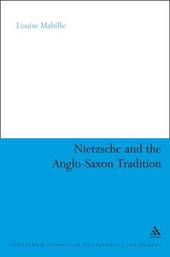
|
Nietzsche and the Anglo-Saxon Tradition
Paperback / softback
Main Details
| Title |
Nietzsche and the Anglo-Saxon Tradition
|
| Authors and Contributors |
By (author) Louise Mabille
|
| Series | Continuum Studies in Continental Philosophy |
|---|
| Physical Properties |
| Format:Paperback / softback | | Pages:218 | | Dimensions(mm): Height 234,Width 156 |
|
| Category/Genre | Western philosophy - c 1600 to c 1900 |
|---|
| ISBN/Barcode |
9781441190581
|
| Classifications | Dewey:193 |
|---|
| Audience | | Postgraduate, Research & Scholarly | |
|---|
| Edition |
NIPPOD
|
|
Publishing Details |
| Publisher |
Continuum Publishing Corporation
|
| Imprint |
Continuum Publishing Corporation
|
| Publication Date |
29 December 2011 |
| Publication Country |
United States
|
Description
This book offers the first detailed examination of the influence of the English-speaking world on the development of Nietzsche's philosophy. In recent years, Nietzsche's reputation has undergone a transformation and he is today seen as one of the greatest defenders of human freedom. His is more than just a model for political liberty. It is a grand vision of what humanity could be if it really unleashed its creative power. And Nietzsche owes more than just a passing debt to the Anglo-Saxon world in the construction of this vision. Yet much of what Nietzsche has to say about the British philosophy reaches the pitch of denunciation and personal insult. He refers to Darwin as 'mediocre'; and to John Stuart Mill as 'that flathead'. While he gladly acknowledges the French roots of his thought, very little has been said about the English giants whose influence abounds in his work. Louise Mabille fills a gap in the scholarship on Nietzsche by offering an important and fascinating account of his engagement with the Anglo-Saxon philosophical tradition.
Author Biography
Louise Mabille teaches Philosophy at the University of Pretoria, South Africa. Her publications include The Rage of Caliban (Maunsel and Co) and articles in several academic journals.
Reviews"Louise Mabille's fascinating book examines Nietzsche from the novel perspective of his professed dislike of the English. Her lively discussions of his 'English' protagonists succeed in clarifying the meaning of Englishness, while also exposing some of the ways in which Nietzsche himself was 'English.' This book is highly recommended for anyone interested in Nietzsche and contemporary Nietzscheanism." - Paul Patton, University of New South Wales, Australia
|